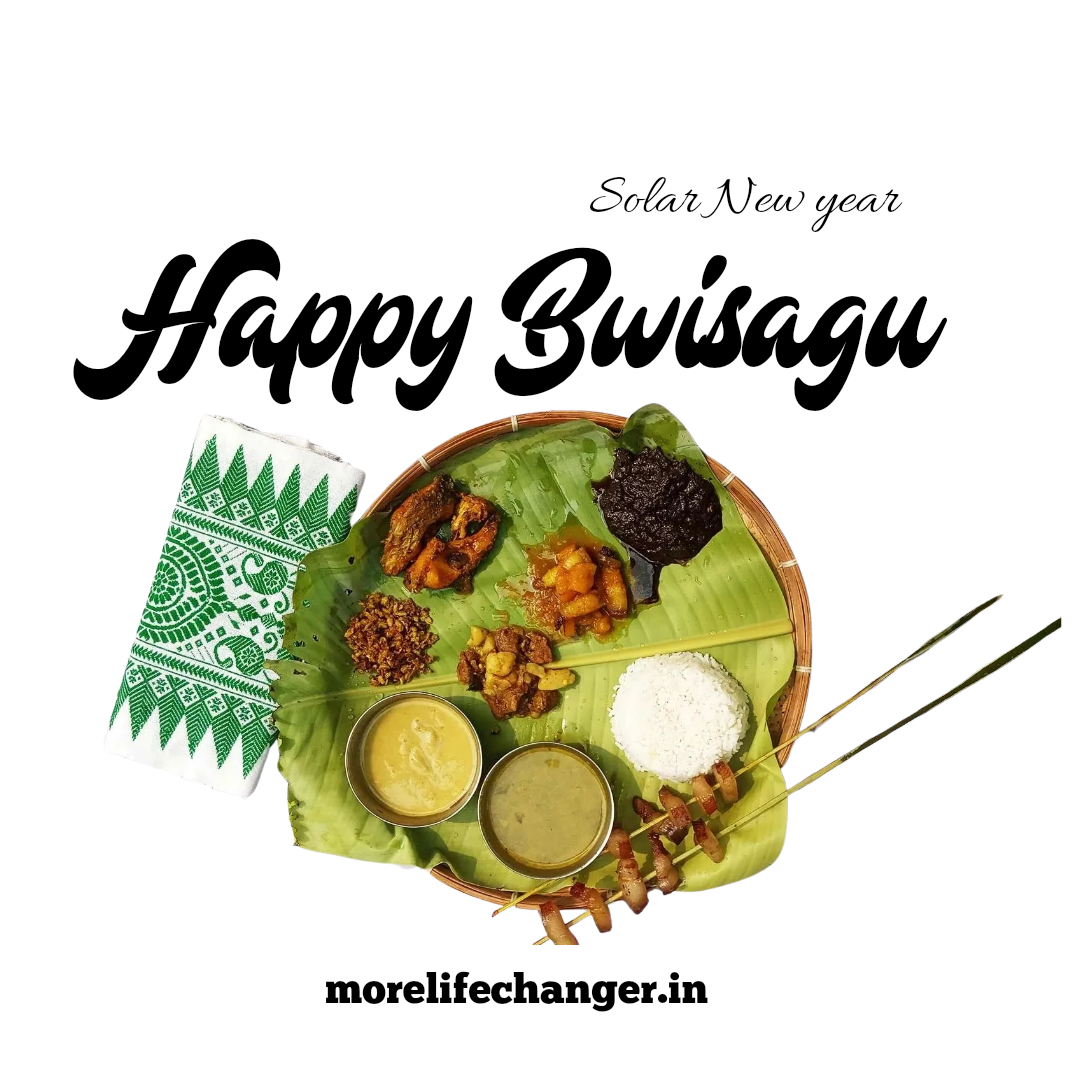Bwisagu is an important festival celebrated by the Bodos (an indigenous ethnic group) in the northeastern part of India, particularly in Assam. It marks the beginning of the Bodo New Year and is celebrated with great enthusiasm in Bodoland and other areas where Bodo communities live.
When is Bwisagu celebrated?
Bwisagu is generally observed during the mid-April, typically around the same time as Baisakhi and Rongali Bihu in Assam. The festival is celebrated on the first day of Baisakh in the Bodo calendar and corresponds to the solar new year.
Significance of Bwisagu
Bwisagu is not only the Bodo New Year but also a celebration of the harvest season. It marks the end of the old harvest cycle and the beginning of a new agricultural year. The festival is dedicated to honoring the gods and spirits for a successful harvest, prosperity, and happiness in the coming year. It also involves paying homage to nature and the agricultural community’s role in sustaining the region.
Cultural and Religious Practices
Bwisagu is a colorful and vibrant celebration filled with cultural and religious rituals. Key activities during Bwisagu include:
- Bwisagu Puja (Worship): The religious aspect of the festival involves prayers and rituals offered to deities and spirits, asking for a bountiful harvest, peace, and prosperity. These rituals typically take place in the home and at community centers, where people gather to worship and celebrate together.
- Dance and Music: One of the most striking features of Bwisagu is the traditional Bodo dance, known as “Bwisagu dance” or “Bagurumba”. This folk dance, performed by both men and women, is characterized by graceful, rhythmic movements and colorful costumes. The dance mimics the movements of nature, especially the wind, and is an important cultural expression during the festival. Traditional Bodo music, accompanied by drums and other instruments, plays a significant role in the festivities.
- Feasting: Similar to many other festivals, feasting is an important part of Bwisagu. Special dishes are prepared, with rice, fish, and meat commonly featuring in the meals. Traditional Bodo food items like “Bodo rice beer” (known as “Chang”), rice cakes, and various sweets are enjoyed by the community.
- Traditional Attire: During Bwisagu, people wear traditional Bodo attire. Men often wear “Phor” (a traditional Bodo garment), and women wear “Dokhona”, a traditional Bodo dress, paired with “Bokha” (a type of scarf). The colorful attire adds to the vibrant atmosphere of the festival.
- Community Celebrations: The festival is marked by community gatherings, where people exchange greetings, share meals, and partake in celebrations. These gatherings are central to the Bwisagu spirit, reinforcing community ties and Bodo identity.
Also read : Solar New Year
Symbolism and Heritage
Bwisagu symbolizes renewal, agriculture, and community solidarity. It celebrates the end of one agricultural cycle and the hope for a prosperous new cycle. The festival highlights the importance of nature, agriculture, and the community’s role in sustaining both.
Historical and Cultural Background of Bwisagu
The Bodo people are an indigenous ethnic group primarily found in the northeastern region of India, especially in Assam. Historically, the Bodos are known for their deep connection to agriculture, as they are an agrarian society that depends heavily on the harvest cycles for their livelihood. Bwisagu is rooted in this agricultural tradition, marking the beginning of a new crop cycle after the winter harvest.
The festival is deeply intertwined with the Bodo people’s spiritual and cultural practices. Their traditional beliefs are based on a reverence for nature, deities, and ancestors, and Bwisagu incorporates rituals and customs that honor these forces. The festival also has a profound connection with the Bodo calendar and agricultural activities, both of which are critical to the Bodo way of life.
Bwisagu and Its Connection to Baisakhi and Rongali Bihu
As mentioned earlier, Bwisagu coincides with other regional festivals like Baisakhi and Rongali Bihu in Assam. Though the festival is specific to the Bodo community, it shares some commonalities with these other harvest festivals.
- Baisakhi is a harvest festival celebrated across northern India, particularly in Punjab, marking the start of the new agricultural season.
- Rongali Bihu (Assamese New Year) is celebrated in Assam at the same time as Bwisagu. While Bwisagu has more specific ties to the Bodo community, Rongali Bihu is celebrated by all Assamese people and is a major festival in the state.
Rituals and Traditions of Bwisagu
Bwisagu is characterized by a series of traditional rituals that hold cultural and religious significance:
1. Bwisagu Puja (Worship)
One of the key elements of the festival is puja or worship. The Bodos offer prayers to various deities and spirits, thanking them for the previous harvest and asking for blessings for the coming agricultural cycle. It is believed that the success of the harvest depends on the gods and the spirits of nature. The rituals usually involve offerings such as fruits, rice, flowers, and incense, along with the chanting of prayers.
The puja is typically performed in family homes and in community temples. Priests, known as Bwisagu Gurus, conduct the rituals, and villagers often join in with hymns and dances.
2. Bagurumba Dance
The Bagurumba dance is a significant cultural expression during Bwisagu. It is a traditional folk dance of the Bodo people, which is believed to represent the movement of the wind and nature. The dance is performed by groups of men and women dressed in traditional attire. Also the dance movements are graceful, symbolizing the flow of the wind, birds flying, and the overall harmony of nature.
The dance is accompanied by drums (especially the “Khul”, a traditional Bodo drum) and other percussion instruments, giving it a rhythmic and vibrant quality. The Bagurumba dance is central to the festival’s celebrations and reflects the Bodo people’s deep respect for the natural world.
3. Traditional Bodo Foods
Food plays an important role in Bwisagu, with a variety of traditional dishes prepared and shared with family and friends. Some of the key items include:
- Rice and Fish: A staple of Bodo cuisine, fish (often pork or chicken) is a common dish during the festival.
- Rice Beer (Chang): Chang, a fermented rice beverage, is often consumed during the celebrations. It is an important part of the festival and is consumed as a symbol of community bonding.
- Traditional Rice Cakes: Special rice cakes, often made with rice flour and jaggery, are prepared as offerings during the festival. These cakes are served to guests and shared among the community.
- Meat Dishes: Pork and other meats are often cooked with herbs and spices, reflecting the traditional Bodo diet.
4. Community and Social Celebrations
Community gatherings are an essential part of Bwisagu. The festival strengthens the sense of unity and solidarity among the Bodo people. Villages come together to celebrate, sing, and dance. The community’s collective effort in organizing these celebrations is a demonstration of their deep cultural connection.
- Feasts are prepared, where families and villagers sit together to share food and exchange stories.
- Songs and traditional folk music are performed. These songs, which are typically passed down through generations, tell stories of the Bodo people’s history, culture, and relationship with nature.
- Public Events like fairs or exhibitions may also take place, showcasing Bodo art, crafts, and cultural performances.
5. Traditional Clothing
During the Bwisagu festival, the Bodo people wear their traditional attire, which is both colorful and symbolic of their heritage:
- Men typically wear Phor, a traditional garment tied around the waist, along with a shirt and a scarf.
- Women wear the Dokhona, a woven cotton garment that is similar to a sari but with its own distinct style, along with a Bokha (scarf) worn on the shoulder.
These traditional clothes are often handwoven and feature intricate designs and patterns that reflect the Bodo culture.
Bwisagu’s Role in the Identity of the Bodo People
Bwisagu holds immense cultural importance for the Bodo people as it reinforces their ethnic identity and connection to their ancestral traditions. The festival serves as a reminder of their agricultural roots and a way to celebrate the harmony between humans, nature, and the divine forces that influence the harvest cycle.
Moreover, Bwisagu also represents the unity of the community, as the festival encourages people to come together, strengthen relationships, and celebrate their shared heritage. It is a festival where the past is honored, and the future is hoped to be prosperous and abundant.
Please join discussion on Facebook about world facts and its secret .

